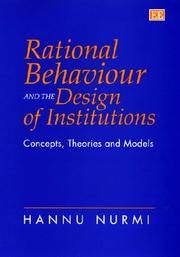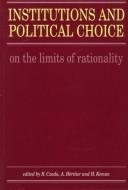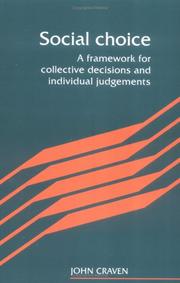| Listing 1 - 10 of 40 | << page >> |
Sort by
|
Book
ISBN: 9780521145589 9781139026697 9780521192200 9781139624442 113962444X 1139026690 9781139615143 1139615149 9781139611428 1139611429 052119220X 0521145589 1107232716 1139609564 113962072X 1107255139 9781107232716 9781139609562 9781107255135 Year: 2013 Publisher: Cambridge Cambridge University Press
Abstract | Keywords | Export | Availability | Bookmark
 Loading...
Loading...Choose an application
- Reference Manager
- EndNote
- RefWorks (Direct export to RefWorks)
The theory of statecraft explores practical politics through the strategies and manoeuvres of privileged agents, whereas the theory of democracy dwells among abstract and lofty ideals. Can these two ways of thinking somehow be reconciled and combined? Or is statecraft destined to remain the preserve of powerful elites, leaving democracy to ineffectual idealists? J. S. Maloy demonstrates that the Western tradition of statecraft, usually considered the tool of tyrants and oligarchs, has in fact been integral to the development of democratic thought. Five case studies of political debate, ranging from ancient Greece to the late nineteenth-century United States, illustrate how democratic ideas can be relevant to the real world of politics instead of reinforcing the idealistic delusions of conventional wisdom and academic theory alike. The tradition highlighted by these cases still offers resources for reconstructing our idea of popular government in a realistic spirit - skeptical, pragmatic, and relentlessly focused on power.
Democracy --- Political science --- Comparative government. --- Comparative political systems --- Comparative politics --- Government, Comparative --- Political systems, Comparative --- Decision-making in political science --- Philosophy. --- Decision making. --- Social Sciences --- Political Science
Book
ISBN: 0333136667 9780333136669 Year: 1974 Publisher: London : Macmillan,
Abstract | Keywords | Export | Availability | Bookmark
 Loading...
Loading...Choose an application
- Reference Manager
- EndNote
- RefWorks (Direct export to RefWorks)
Sociology of policy --- Welfare economics --- Decision Making in political science --- Mathematical models --- 330.1 --- Social choice --- Choice, Social --- Collective choice --- Public choice --- Choice (Psychology) --- Social psychology --- Economische grondbegrippen. Algemene begrippen in de economie --- Social choice. --- 330.1 Economische grondbegrippen. Algemene begrippen in de economie --- Welfare economics - Mathematical models --- Decision Making in political science - Mathematical models
Book
ISBN: 0199842442 1283096412 9786613096418 0190208295 Year: 2011 Publisher: New York, N.Y. : Oxford University Press,
Abstract | Keywords | Export | Availability | Bookmark
 Loading...
Loading...Choose an application
- Reference Manager
- EndNote
- RefWorks (Direct export to RefWorks)
A prominent scholar once noted that lotteries in politics & society--to break vote ties, assign students to schools, draft people into the military, select juries--are 'at first thought absurd, & at second thought obvious.' Lotteries have been part of politics since the Greek & Roman times, & they are used widely in American politics today.
Lotteries. --- Decision making. --- Political science --- Decision-making in political science --- Deciding --- Decision (Psychology) --- Decision analysis --- Decision processes --- Making decisions --- Management --- Management decisions --- Choice (Psychology) --- Problem solving --- Gambling --- Decision making
Book
ISBN: 131673045X 1316681726 131673238X 110716379X 1316615413 9781107163799 9781316615416 9781316681725 Year: 2016 Publisher: Cambridge (United Kingdom): Cambridge university press,
Abstract | Keywords | Export | Availability | Bookmark
 Loading...
Loading...Choose an application
- Reference Manager
- EndNote
- RefWorks (Direct export to RefWorks)
"Governance is about governing, and governing is predominantly about making decisions. This might appear to be a truism but we assert that much of the governance literature in general, and the development of governance theory in particular, has lost perspective on what constitutes the core issue of democratic governance; governing. Equally important, governing frequently means making and enforcing unpopular decisions which require a solid institutional framework and a regulated process. Again, decision making is at the heart of governing and governance. It is generally acknowledged that governing contemporary society is a more challenging task compared to just a few decades ago as a result of increasing social complexity and globalization. Governments around the world address this complexity by engaging societal partners in the process of governing but this strategy has entailed complex contingencies related to the organization and management of collaborative forms of governance. Most academic observers of governance have interpreted these developments as proof of a "shift" in the locus of political power from government to networks and other forms of exchange between state and society. In an effort to produce new analytical models to study the collaborative dimension of governance most political scientists seem to ignore the fundamental circumstance that the state remains very much at the centre of governance"-- "Decision-making is at the heart of governing and governance, and is a more challenging task compared to just a few decades ago as a result of increasing social complexity and globalization. In this book, B. Guy Peters and Jon Pierre propose a new framework for the comparative analysis of governance, arguing that government remains a central actor in governance. By articulating the functionalist dimension of governance they show how goal setting, resource mobilization, decision-making, implementation and feedback can be performed by a combination of different types of actors. Even so, effective governance requires a leading role for government. The framework is also applied to a taxonomy of governance arrangements and national styles of governing. Comparative Governance advances our knowledge about governance failure and how forms of governance may change. It also significantly strengthens the theory of governance, showing how governance can be studied conceptually as well as empirically"--
Comparative government. --- Political science --- Public administration --- Decision-making in public administration --- Decision-making in political science --- Comparative political systems --- Comparative politics --- Government, Comparative --- Political systems, Comparative --- Decision making. --- Comparative government --- Political science - Decision making --- Public administration - Decision making
Book
ISBN: 9781009323178 9781009323161 9781009323192 Year: 2023 Publisher: Cambridge ;New York, NY Cambridge University Press
Abstract | Keywords | Export | Availability | Bookmark
 Loading...
Loading...Choose an application
- Reference Manager
- EndNote
- RefWorks (Direct export to RefWorks)
Models of democratic decision-making tend to assume that voters have preferences and that candidates adjust their platforms to conform with those preferences; however, the direction of causation is largely the opposite. Political elites offer policy platforms to voters, and voters adopt those policies - they follow their leaders. Following Their Leaders argues that policies are designed by the elite and the electorate has little say. Preferences for public policy tend to be anchored in a political identity associated with a candidate, party, or ideology; voters' preferences on most issues are derived from their anchor preferences. Holcombe argues that because citizens adopt the policies offered by the elite, democratic institutions are ineffective constraints on the exercise of political power. This volume explores political institutions that help control the elite who exercise political power and discusses the implications political preferences have on democracies.
Political psychology. --- Politics, Practical. --- Political science --- Decision making. --- Decision-making in political science --- Electoral politics --- Mass political behavior --- Political behavior --- Politics --- Practical politics --- Political participation --- Politics, Practical --- Psychology, Political --- Psychology --- Social psychology --- Psychological aspects

ISBN: 1858988047 Year: 1998 Publisher: Cheltenham Elgar
Abstract | Keywords | Export | Availability | Bookmark
 Loading...
Loading...Choose an application
- Reference Manager
- EndNote
- RefWorks (Direct export to RefWorks)
Microeconomics --- Politics --- Operational research. Game theory --- Political science --- Rational choice theory. --- Politique --- Choix rationnels, Théorie des --- Decision making. --- Prise de décision --- #SBIB:35H006 --- #SBIB:324H50 --- #SBIB:IO --- Bestuurswetenschappen: theorieën --- Politieke participatie en legitimiteit (referenda, directe democratie, publieke opinie...) --- Choix rationnels, Théorie des --- Prise de décision --- Rational choice theory --- Decision-making in political science --- Decision making --- Social choice
Book
ISBN: 0140550984 Year: 1975 Publisher: Harmondsworth Penguin books
Abstract | Keywords | Export | Availability | Bookmark
 Loading...
Loading...Choose an application
- Reference Manager
- EndNote
- RefWorks (Direct export to RefWorks)
Political sociology --- 343.9 --- Power (Social sciences) --- Violence --- Political science --- -Administration --- Civil government --- Commonwealth, The --- Government --- Political theory --- Political thought --- Politics --- Science, Political --- Social sciences --- State, The --- Violent behavior --- Social psychology --- Empowerment (Social sciences) --- Political power --- Exchange theory (Sociology) --- Sociology --- Consensus (Social sciences) --- Criminologie --(algemeen) --- Decision-making --- -Criminologie --(algemeen) --- 343.9 Criminologie --(algemeen) --- -Violent behavior --- Administration --- Decision-making in political science

ISBN: 9053835911 9053834982 Year: 1998 Publisher: Amsterdam VU University Press
Abstract | Keywords | Export | Availability | Bookmark
 Loading...
Loading...Choose an application
- Reference Manager
- EndNote
- RefWorks (Direct export to RefWorks)
Political philosophy. Social philosophy --- Political sociology --- 323 --- 338.22 --- #SBIB:324H20 --- #SBIB:35H006 --- #SBIB:IO --- Binnenlandse politiek --- Economische organisatieleer. Economisch beleid. Economische politiek --- Politologie: theorieën (democratie, comparatieve studieën….) --- Bestuurswetenschappen: theorieën --- 338.22 Economische organisatieleer. Economisch beleid. Economische politiek --- 323 Binnenlandse politiek --- Political science --- Public institutions --- Government institutions --- Institutions, Public --- Institutions, State --- State institutions --- Associations, institutions, etc. --- Decision-making in political science --- Decision making

ISBN: 0521310512 0521325366 051152191X 9780521325363 9780521310512 9780511521911 Year: 1992 Publisher: Cambridge Cambridge University Press
Abstract | Keywords | Export | Availability | Bookmark
 Loading...
Loading...Choose an application
- Reference Manager
- EndNote
- RefWorks (Direct export to RefWorks)
This textbook provides a survey of the literature of social choice. It integrates the ethical aspects of the subject, (discussing potentially desirable conditions for social judgements) with positive aspects of decision mechanisms that centre on the revelation of true preferences. The literature on the subject presently consists of a great many papers. This book draws them together in common notation and points out interpretations which are often missing in specialist papers. Applications in economics, electoral politics, and ethics are discussed. The book will be used by senior undergraduate and graduate students of economics, political science and philosophy as a text book in the subject.
Social choice. --- Economics --- Political science --- Political aspects. --- Decision making. --- Business, Economy and Management --- Economics - Political aspects. --- Political science - Decision making. --- Decision-making in political science --- Economic theory --- Political economy --- Social sciences --- Economic man --- Choice, Social --- Collective choice --- Public choice --- Choice (Psychology) --- Social psychology --- Welfare economics

ISBN: 0472111760 0472087231 9780472087235 9780472111763 Year: 2001 Publisher: Ann Arbor University of Michigan press
Abstract | Keywords | Export | Availability | Bookmark
 Loading...
Loading...Choose an application
- Reference Manager
- EndNote
- RefWorks (Direct export to RefWorks)
Comparative government. --- Political science --- Rational choice theory. --- Decision making. --- #SBIB:324H40 --- Social choice --- Decision-making in political science --- Comparative political systems --- Comparative politics --- Government, Comparative --- Political systems, Comparative --- Politieke structuren: algemeen --- Comparative government --- Rational choice theory --- Decision making --- Political science - Decision making.
| Listing 1 - 10 of 40 | << page >> |
Sort by
|

 Search
Search Feedback
Feedback About UniCat
About UniCat  Help
Help News
News